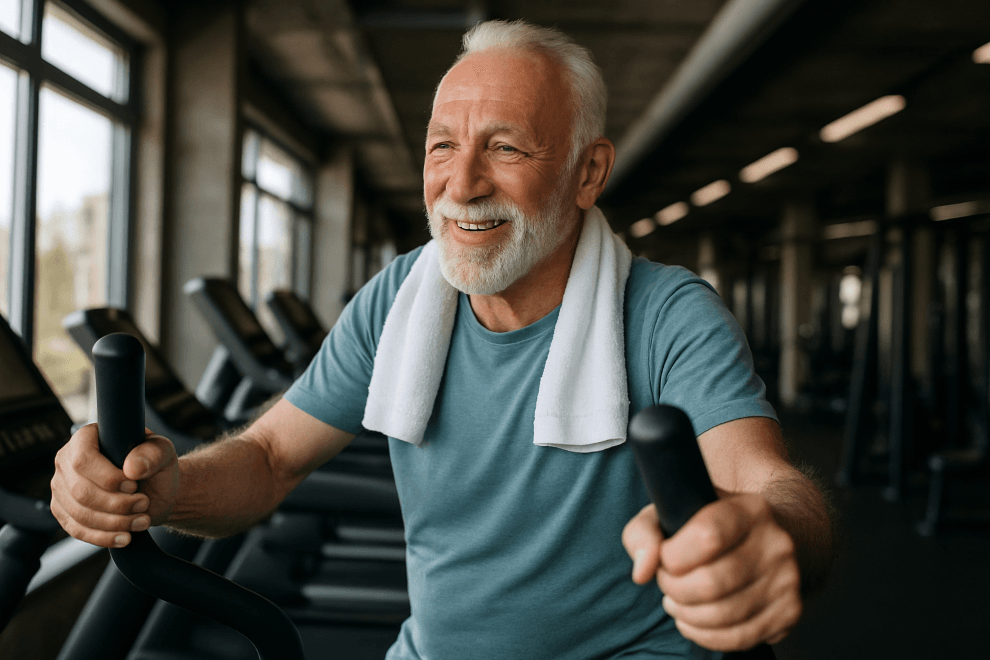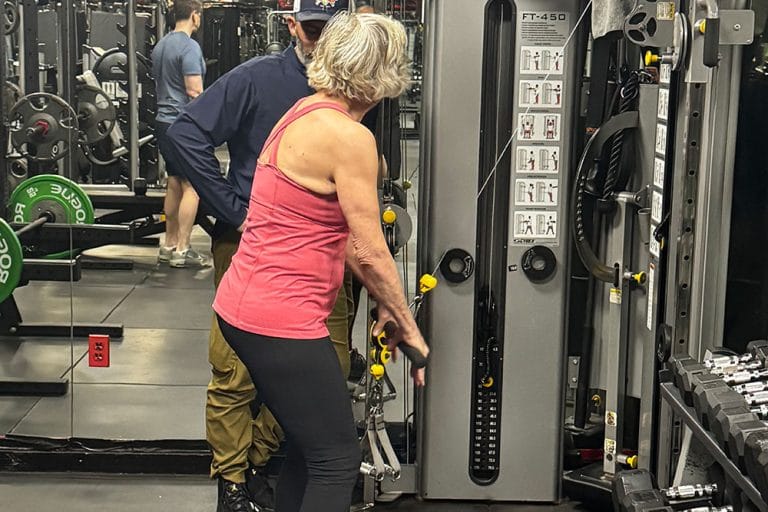Shine a Light on Alzheimer’s Awareness Month and the Power of Exercise for Brain Health
Every November, the world recognizes Alzheimer’s Awareness Month — a vital time to educate, reflect, and take action in the fight against Alzheimer’s disease. As one of the leading causes of cognitive decline, Alzheimer’s impacts millions of individuals and families across the U.S. While there is currently no cure, research continues to show that exercise and physical activity can play a crucial role in supporting both brain and body health.
At CoreFitnessNYC, located on the Upper East Side (UES), the focus for Alzheimer’s Awareness Month is on helping members build stronger, healthier lives through customized fitness programs. For those looking to protect their cognitive health, boost memory, and improve mental well-being, creating a consistent exercise regimen is one of the most powerful tools available.
Understanding Alzheimer’s Disease
Alzheimer’s disease is a progressive neurological disorder that affects memory, thinking, and behavior. It’s the most common form of dementia, accounting for 60 to 80 percent of dementia cases. According to the Alzheimer’s Association, over 6 million Americans are currently living with Alzheimer’s — a number projected to more than double by 2050.
While age and genetics are major risk factors, lifestyle choices such as diet, exercise, and stress management play an essential role in brain health. Emerging research shows that people who maintain a regular fitness routine have a significantly lower risk of developing Alzheimer’s or other forms of dementia later in life.
This Alzheimer’s Awareness Month, CoreFitnessNYC encourages everyone — regardless of age or ability — to take proactive steps to maintain both physical and cognitive fitness.
The Connection Between Exercise and Brain Health
The link between physical activity and brain function is undeniable. Exercise stimulates blood flow to the brain, promotes the growth of new neural connections, and helps reduce inflammation — all key factors in protecting against cognitive decline.
Studies published in journals such as Neurology and The Lancet show that regular aerobic exercise (such as walking, cycling, or strength training) can help improve memory, slow mental aging, and reduce Alzheimer’s-related changes in the brain.
At CoreFitnessNYC, personal trainers design customized programs that combine cardiovascular exercise, resistance training, balance work, and flexibility exercises — each contributing to brain and body resilience.
Here’s how each component supports mental health and brain performance:
Cardiovascular Training: Boosts heart health, increases oxygen flow to the brain, and enhances neuroplasticity — the brain’s ability to form new connections.
Strength Training: Improves insulin sensitivity and reduces inflammation, both linked to cognitive protection.
Balance and Coordination Work: Stimulates the cerebellum and motor cortex, strengthening the brain’s control over movement and reaction.
Flexibility and Mobility Exercises: Reduce stress and tension, encouraging mental clarity and mindfulness.
Exercise as a Preventive Tool for Alzheimer’s
Prevention starts with action for Alzheimer’s Awareness Month. The Alzheimer’s Association and numerous medical studies have shown that maintaining an active lifestyle is one of the top ways to prevent or delay the onset of Alzheimer’s disease. Exercise doesn’t just strengthen the body — it enhances mental sharpness and emotional stability.
People who work out regularly experience:
Improved memory and attention
Better mood and reduced anxiety
Lower risk of cardiovascular disease, which is closely linked to dementia risk
Healthier sleep patterns are vital for memory consolidation
When you train at CoreFitnessNYC on the Upper East Side, you’re not just working out; you’re investing in long-term brain health. The gym’s expert trainers provide one-on-one attention, ensuring that every session challenges both the body and the mind.
How CoreFitnessNYC Supports Cognitive and Physical Wellness
Located in the heart of the Upper East Side (UES), CoreFitnessNYC is more than a gym — it’s a personalized fitness hub focused on total-body wellness. Each trainer specializes in helping clients achieve balance, endurance, and strength through science-based training programs.
Here’s how CoreFitnessNYC helps members protect both mental and physical health:
Personalized Fitness Assessments: Trainers evaluate your current fitness level, mobility, and goals to design a plan that supports brain and body wellness.
Cognitive-Boosting Workouts: Every workout combines strength, cardio, and coordination drills to activate neural pathways and improve cognitive performance.
Stress Management Through Movement: Exercise helps regulate stress hormones like cortisol and releases endorphins that boost mood — key to supporting mental health.
Consistency and Accountability: Staying active requires routine. CoreFitnessNYC helps members stay committed through individualized guidance and motivation.
Community and Connection: Social engagement plays a major role in brain health. The welcoming environment at CoreFitnessNYC encourages connection and positivity, reducing feelings of isolation.
Practical Tips to Keep Your Brain and Body Healthy
This Alzheimer’s Awareness Month, commit to creating a healthy daily routine that supports both your physical and mental well-being.
Here are a few ways to start:
1. Move Daily
Even a 30-minute brisk walk can help boost memory and focus. Consistency is key — find an activity you enjoy and make it part of your routine.
2. Prioritize Strength and Balance
Incorporate resistance training, yoga, or Pilates two to three times a week to improve muscle tone, stability, and brain connectivity.
3. Stay Mentally Active
Challenge your brain with new activities: read, learn a language, or practice puzzles that stimulate cognitive function.
4. Eat a Brain-Healthy Diet
Focus on a Mediterranean-style diet — rich in leafy greens, omega-3s, berries, and whole grains — to nourish the brain.
5. Manage Stress
Chronic stress can accelerate cognitive decline. Incorporate breathing exercises, meditation, or gentle stretching to reset your mind.
6. Get Quality Sleep
Aim for 7–8 hours of uninterrupted sleep. Deep sleep is when your brain clears toxins and consolidates memories.
By integrating these habits into regular workouts at CoreFitnessNYC during Alzheimer’s Awareness Month, you can lay a foundation for lifelong brain and body health.
Why the Upper East Side Chooses CoreFitnessNYC
The Upper East Side community values longevity, health, and an active lifestyle, especially for Alzheimer’s Awareness Month. CoreFitnessNYC understands that fitness isn’t just about aesthetics — it’s about preserving vitality, mobility, and mental sharpness as you age.
Clients appreciate CoreFitnessNYC’s individualized approach, where every session is built around their specific health goals, energy levels, and physical needs. Whether you’re recovering from injury, managing a chronic condition, or simply want to enhance your brain health, the trainers provide expert guidance that keeps workouts effective and engaging.
The gym’s environment encourages focus and consistency — essential factors for maintaining cognitive and emotional health. With private and semi-private training options, clients receive the attention and support they need to build a sustainable, brain-healthy fitness lifestyle. Trainers at CoreFitnessNYC celebrate brain health for Alzheimer’s Awareness Month.
Taking Action This Alzheimer’s Awareness Month
Alzheimer’s Awareness Month is more than a time to wear purple or share statistics — it’s a reminder that we have the power to make changes that protect our future selves. Exercise is one of the most accessible, effective ways to promote mental clarity, cognitive resilience, and emotional balance.
If you’re ready to take control of your health, CoreFitnessNYC on the Upper East Side is ready to help. The Independent trainers will guide you in creating a personalized fitness plan that strengthens your body, sharpens your mind, and supports your long-term well-being.
Together, we can make movement a form of prevention — and turn awareness into action. Let’s get moving for Alzheimer’s Awareness Month.



